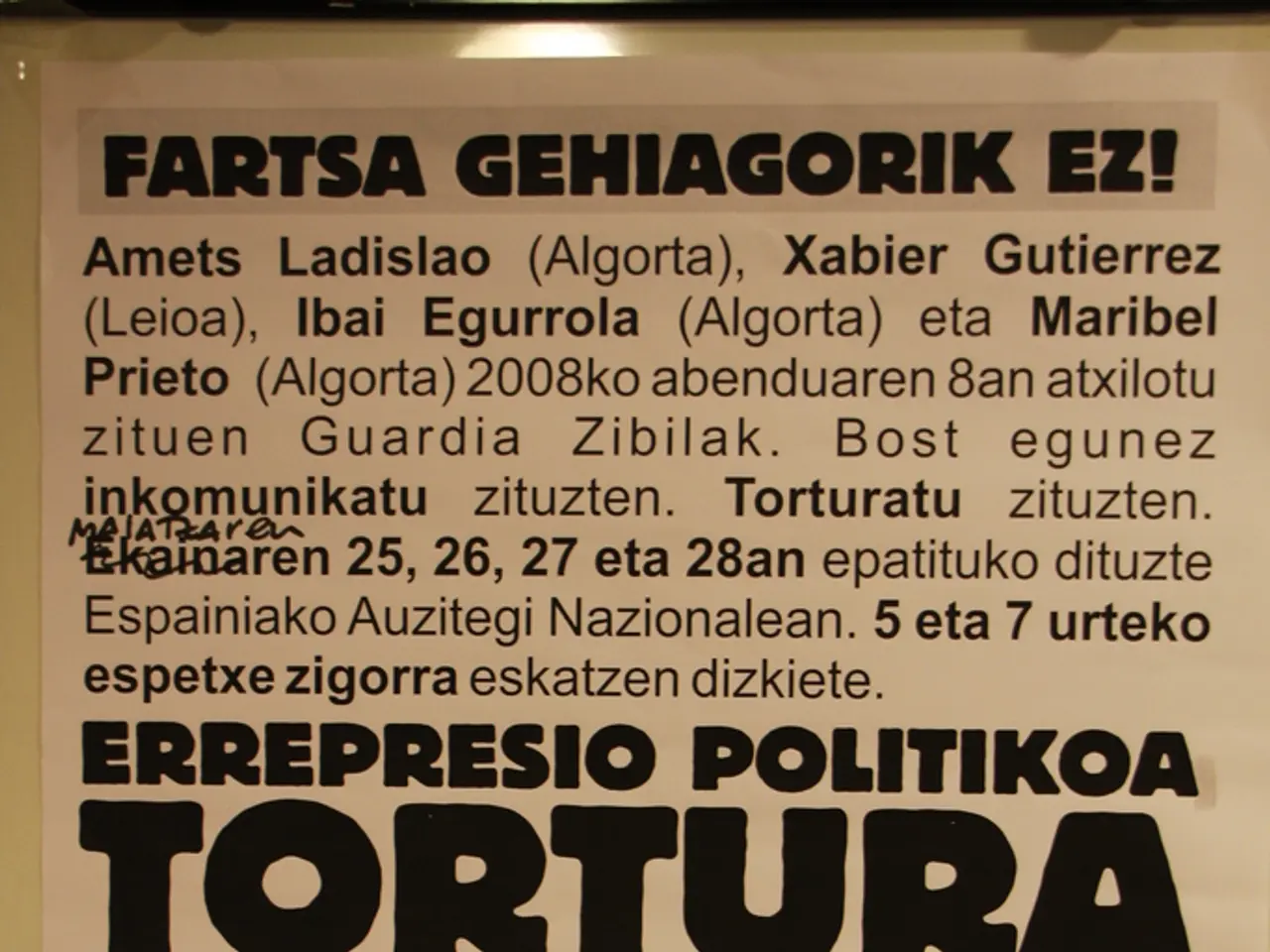Government Opposes Pact Between PP and Vox Restricting Muslims' Right to Pray at Jumilla Sports Center
In the heart of Murcia, a heated dispute between Jumilla Town Hall and the national government of Spain has emerged over a municipal ban on religious acts in public sports facilities. The ban, supported by the conservative Popular Party (PP) and far-right Vox, has been criticised for targeting Muslim religious celebrations such as Eid al-Fitr.
The central government has declared the ban unconstitutional, emphasising that it violates constitutional religious freedom protections. Specifically, Jumilla’s town council passed a motion preventing “religious, cultural or social activities alien to our identity” in public sports facilities, effectively blocking Muslim events without explicit approval.
The controversy has significant implications for religious freedom and coexistence in Jumilla. Critics argue the ban risks increasing divisions and undermining coexistence, especially given recent heightened tensions and ethnic clashes in nearby towns involving immigrant communities. The move is widely seen as exacerbating fear among Jumilla’s substantial Muslim population, raising concerns about marginalisation and discrimination.
The Spanish constitution guarantees freedom of religion, which Spanish authorities stress has been violated by Jumilla’s ban. The Catholic Church also defended the right to public religious expression, countering Vox’s stance that espouses Christian exclusivity.
The dispute underscores broader political fracture lines, with Vox pushing anti-immigrant, Christian identity rhetoric while national and regional governments oppose these measures as unconstitutional and socially damaging. The Church’s support for religious freedom drew sharp criticism from Vox leaders, highlighting tensions between political and religious institutions over identity and inclusion.
Jumilla Town Hall has received the central government's request to annul the agreement prohibiting religious acts in sports facilities and has a month to respond. The Government argues that the exclusion of religious acts without proving public disorder or conflict of uses is an unjustified restriction of the collective exercise of worship. They believe the agreement incurs in abuse of power by using municipal competence for ideological purposes.
The agreement, made between PP and Vox, prohibits religious acts, specifically Islamic celebrations, in Jumilla. The Government believes the regulations allow the use of the sports center for socio-cultural activities, so the reasons given for the prohibition are not sustainable.
The dispute has received support from various quarters, with the Spanish Episcopal Conference expressing its support for the Muslim community. Meanwhile, Montse Mínguez, the spokesperson for the PSOE, has criticised the PP for reducing coexistence, rights, and opportunities, and institutionalising Islamophobia and racism.
Félix Bolaños, the Minister of the Presidency, Justice and Relations with the Courts, has defended the Constitution, rights, and religious freedom, stating that they will stop the ultra measures of PP-Vox. Juan Bravo, the PP's vice-secretary of Treasury, Housing, and Infrastructure, has defended freedom of worship and called for not generating more conflict.
Walid Habbal, coordinator of the Islamic Commission of the Region of Murcia, is optimistic about the government's decision and believes that if the change in the ordinance regulating the use of the sports center had been applied, it would have been a huge step backwards.
Santiago Abascal, the president of Vox, has lashed out against the "silence" of the "ecclesiastical hierarchy" and suggested that their lack of criticism of the Pedro Sánchez government may be due to "public funds they receive."
Jumilla, with around 27,000 inhabitants and a large Muslim community, has been at the centre of this contentious issue. The restriction of fundamental rights must be duly motivated, based on objective criteria, and subject to proportionality control, as established by the Constitutional Court. The central government's intervention to annul Jumilla’s ban reflects a constitutional defence of religious freedom and an attempt to preserve peaceful coexistence among Jumilla’s diverse communities. The dispute reveals ongoing social and political fault lines in Murcia around immigration, identity, and the role of religion in public life.
References:
- El País. (2021, November 29). El Gobierno pide a Jumilla que anule la prohibición de actos religiosos en instalaciones deportivas. Retrieved from https://elpais.com/politica/2021/11/29/actualidad/1638287456_727775.html
- El Mundo. (2021, November 29). El Gobierno pide a Jumilla que anule la prohibición de actos religiosos en instalaciones deportivas. Retrieved from https://elpais.com/politica/2021/11/29/actualidad/1638287456_727775.html
- ABC.es. (2021, November 29). El Gobierno pide a Jumilla que anule la prohibición de actos religiosos en instalaciones deportivas. Retrieved from https://elpais.com/politica/2021/11/29/actualidad/1638287456_727775.html
- La Vanguardia. (2021, November 29). El Gobierno pide a Jumilla que anule la prohibición de actos religiosos en instalaciones deportivas. Retrieved from https://elpais.com/politica/2021/11/29/actualidad/1638287456_727775.html
- El Confidencial. (2021, November 29). El Gobierno pide a Jumilla que anule la prohibición de actos religiosos en instalaciones deportivas. Retrieved from https://elpais.com/politica/2021/11/29/actualidad/1638287456_727775.html
The dispute over Jumilla's municipal ban on religious acts in public sports facilities, supported by political parties like the PP and Vox, has garnered criticism for the potential increase in divisions and undermining coexistence, particularly among immigrant communities. This controversy, which has drawn the attention of various authorities and religious institutions, is reflective of ongoing social and political fault lines in Murcia around immigration, identity, and the role of religion in public life. It is also a significant policy-and-legislation issue in the general news sphere, touching on questions of religious freedom, politics, and sports.







